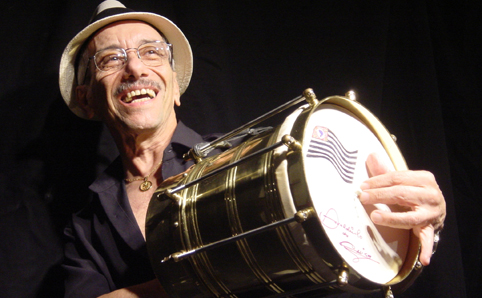
Osvaldinho da Cuíca, born and raised in Tucuruvi, in the north of São Paulo, was first introduced to samba as a teenager, going on to became a professional musician in 1955. He recorded with big names in the samba movement like Adoniran Barbosa, Nelson Gonçalves, Ângela Maria, Geraldo Filme, Germano Mathias, Cartola, Beth Carvalho, D. Ivone Lara, Toquinho and Vinícius de Moraes, as well as playing with the São Paulo-based samba group, Demônios da Garoa, for 15 years.
As one of the key players in an era that saw a transformation in both São Paulo and Brazilian samba, he is often asked to participate in projects that preserve and cherish the genre. In 2009, his memories of that era were documented in the book Batuqueiros da Pauliceia, written in collaboration with researcher André Domingues (Editora Barcarolla, in Portuguese). Three years later, in 2012, he co-wrote, featured in, and performed – alongside sambista Germano Mathias – the musical production A História do Samba Paulista, telling the history of São Paulo samba through anecdotes and songs.
Da Cuíca, is still very much involved in samba in São Paulo – he was a founding member of the ala de compositores (a group of composers) at the samba school Vai-Vai. He also wrote the samba 'Vai Vai Corinthians', in 1974, about the São Paulo football team, and two years later gave his permission for it to be used by the Gaviões da Fiel – a Carnival bloco comprised of Corinthians fans which has grown to become a samba school.
What was the research like for the book Batuqueiros da Pauliceia?
It was based on my knowledge and that of the author André Domingues, who is very interested in Brazilian popular music. It's a compendium. I’ve been doing samba for almost 60 years. I'm always reading about it in magazines and old newspapers. I did a lot of research when I wrote A História do Samba Paulista, and when I made the film about composer Geraldo Filme (Geraldo Filme e o Samba Paulista, 1998).
During your research and conversations with friends and researchers, do you ever learn surprising new details about samba?
I'm surprised by the lies that crop up, even from academics. I can't be led by people who know less than I do. Like [musicologist] Ricardo Cravo Albin. He takes information from academics and the information comes out all wrong. Or when they say that Francisco Paulo Gallo is the founder of Demônios da Garoa. That's not the case at all.
It surprises me how this group of charlatans that is studying and doing post-grad degrees acts like they know better than those who know the real history. I'm part of the history. I didn't go looking on a computer or in the library. I do research, it helps me to further my knowledge, but I experienced the transformation of samba. I recorded with [singer-songwriter] Ismael Silva [1905-78]. I have a really broad knowledge of MPB and samba – it’s not just focused on samba schools.
What's your view of samba in São Paulo these days?
I like to see young people doing serious work. Samba da Vela, for example, is no longer old, but a reference, it’s creative.
Is samba a genuine representation of the people of the city of São Paulo?
Not just of the city. Of the country. Frank Sinatra recorded ‘Garota de Ipanema’ (‘The Girl from Ipanema’) – it doesn’t matter if it’s bossa nova or bossa velha [‘old bossa’ – samba was a precursor to bossa nova].
How is samba important as a representation of the less fortunate classes?
Samba has always been the spokesman of the oppressed. It speaks of God and the Devil, good and evil. It is always present. Samba and Carnival songs were pioneers in criticising and praising. It's a representation that goes beyond happiness, the ordinary, the commonplace.
In my new CD (Osvaldinho da Cuíca – 70 Anos, 2010), on the second track, 'Vai Haver Temporal', a samba-rock song, the lyrics say: 'Is everything OK? / Tomorrow brings the sadness of the poor in the newspaper / It’s the favela... / Brazil's never-ending soap opera.' Samba was always a cry of despair – a cry of suffocation and joy.



